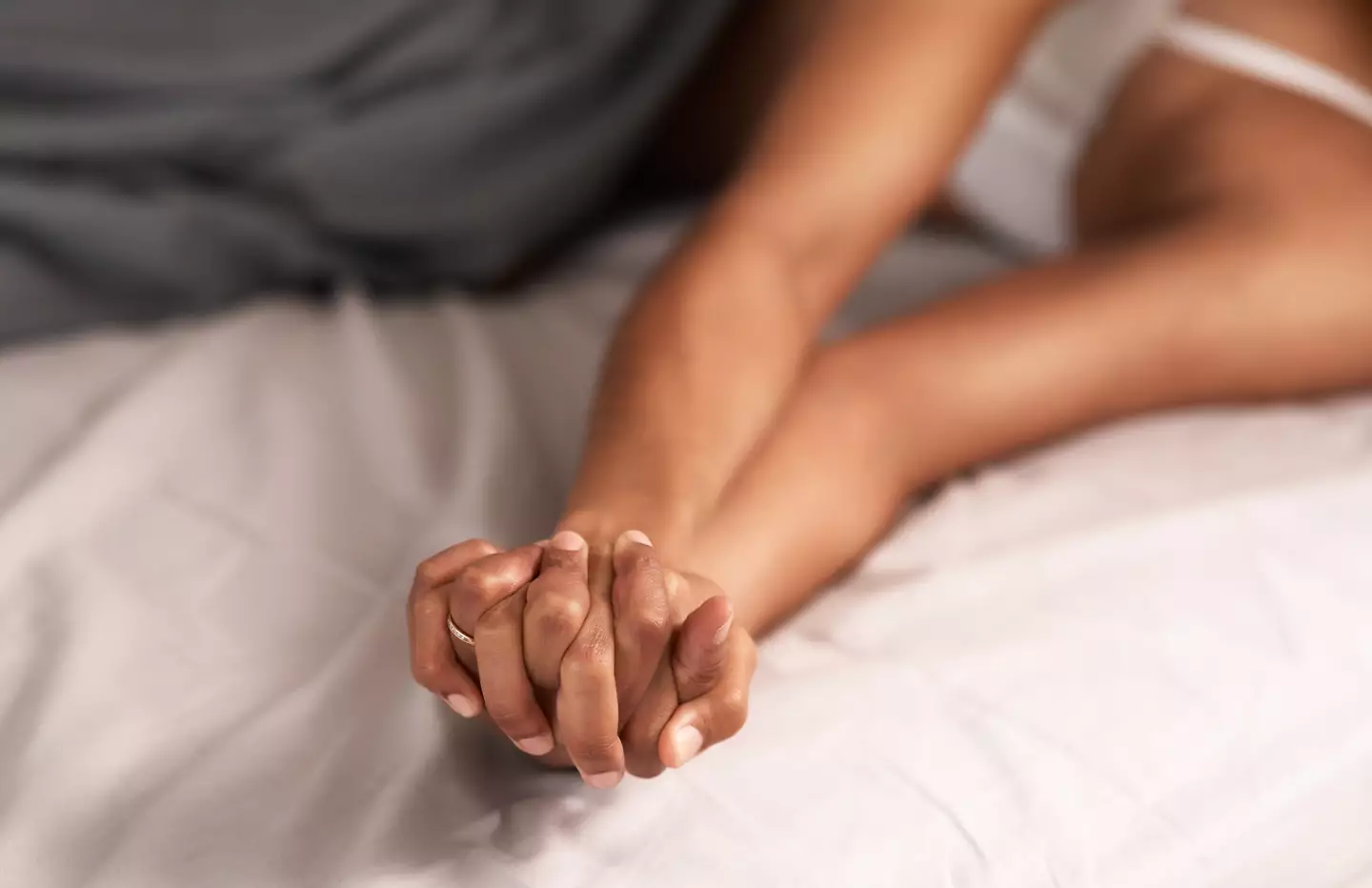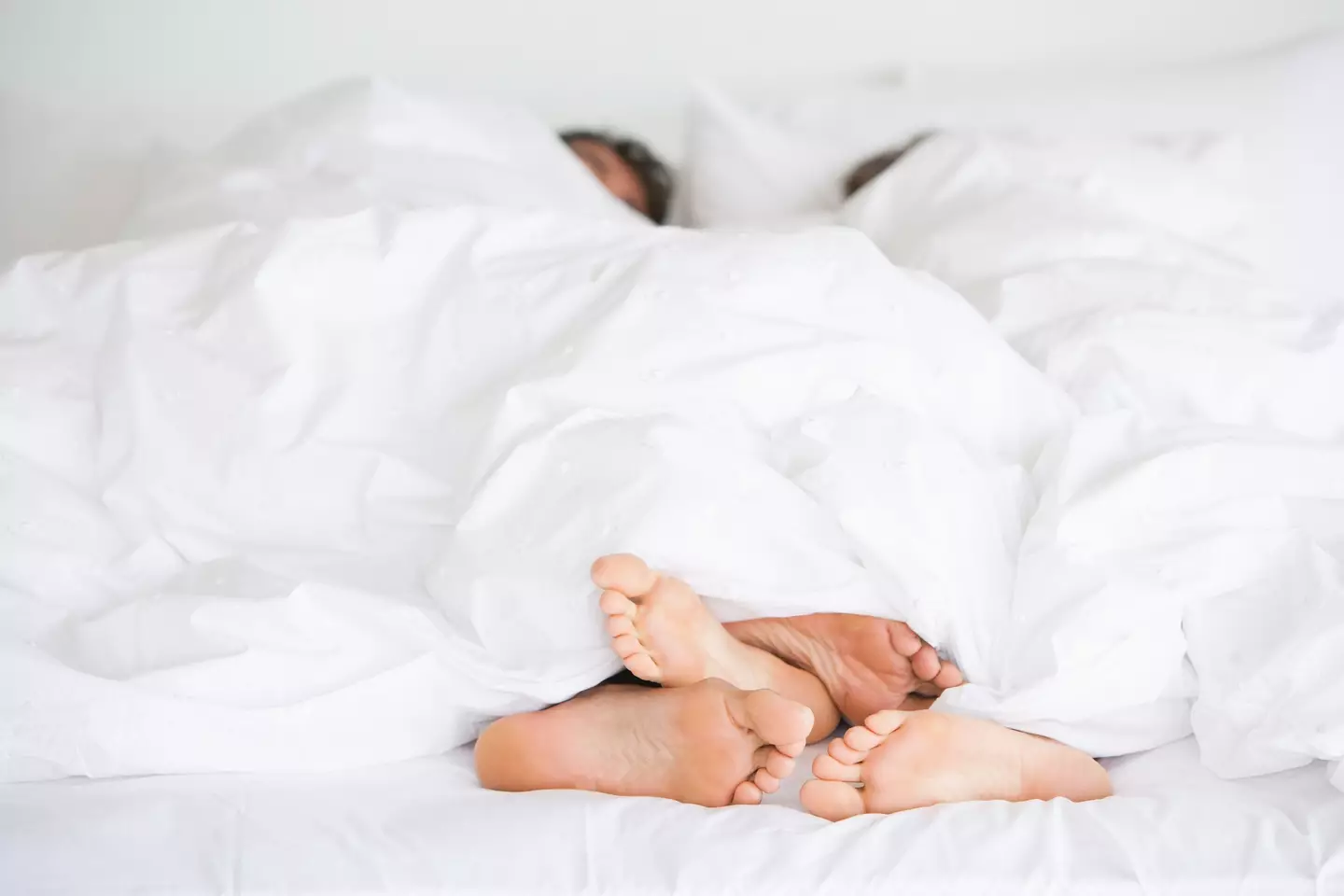Sex is an important part of most relationships and can even be a make-or-break for some couples.
But did you know there’s a specific time you should be getting busy under the covers? And what’s more – it all depends on your age.
Healthline reported that one study revealed how libido is affected by your hormone levels, so the higher they are, the more ‘in the mood’ you will feel.
Both oestrogen and testosterone levels are at their peak in the AM, so it makes sense that it’s the time most people feel frisky.
Backing this up, research from Lovehoney revealed that men are generally more up for sex between 6am and 9am, as reported by Metro.
But the study also sheds light on when exactly the best time to have sex with your partner is based on the age group you fall into.


Sex is an important part of many relationships (Getty Images)
Your twenties
Although morning sex appears to be a firm favourite, the good news if you’re in your twenties is the best time is actually any time.
This is because it’s the period of your life where your hormones are raging and you’re ‘at your peak fertility-wise’.
April Maria, a sexologist at Hot Octopuss, told the Metro that the best time is ‘whenever the mood strikes.’
Hormone health expert Mike Kocsis also told the publication: “You have a higher libido, especially around ovulation, and you have more energy and emotional response to intimacy.”
.jpg)
.jpg)
According to scientific studies, morning sex can have unbelievable benefits (Getty Images)
Your thirties
When you get to your thirties however, priorities are changing and the time you have for intimacy can be few and far between.
This era of your life is the time for ‘scheduled sex’, with the experts suggesting the best time of day is actually just whenever you have time.
The bad news is that as you get busier, you get more stressed and stress hormones can interfere with sex hormones.
The publication reports that the expert warns it can increase prolactin which ‘suppresses reproductive function’ as well as decreasing dopamine.
Your forties
When you enter your forties, ‘spontaneity’ could make a comeback within your relationship and sex life.
Expert Mike told the publication that ‘you might find weekends, lunch breaks, or those spontaneous, stolen moments suit you best’.
However, he also points out that your libido could be lower due to the menopause, which typically occurs between the ages of 45 and 55.
The NHS website explains that If you have low sex drive because of menopause and HRT does not improve it, you may be offered testosterone.


When you enter your forties, it’s all about ‘spontaneity’ (Tom Merton / Getty Images)
Your fifties
In your fifties, both oestrogen and testosterone start to decline so sex might not be as frequent – but that’s not what this time period is about.
The experts suggests that it’s more about ‘sensuality’ and making the most of when your energy levels are up for it.
Morning or midday are most likely your best bets for getting busy with your sex life if you’re aged between fifty and sixty.
Sixties and over
Finally, things could come full circle in your sixties and you may find yourself with a sex life as active as it was back in your twenties.
With children having fled the nest and retirement on the horizon, this age group can find themselves with a lot of time on their hands.
But the best time to have sex, according to the experts, would be afternoons and early evenings.
With less life stresses there should be plenty more opportunity than the previous three decades of your life.
Featured Image Credit: Getty Images
Topics: Health, Sex and Relationships, Life


Doctors have issued an urgent warning to anyone having unprotected sex over links to a ‘silent killer’.
A University of Connecticut School of Medicine study found that there is ‘clearly’ an association between human papillomavirus (HPV) and the disease in question which, according to the World Health Organisation, is responsible for the deaths of 17.9 million people every year, making it the leading cause of death worldwide.
Spread through skin-to-skin contact, the NHS explains that HPV is the name of a very common group of viruses and, while they do not cause any problems in most people, some types can trigger chronic inflammation in the body as well as cause genital warts or cancer.


A University of Connecticut School of Medicine study has found a link between human papillomavirus (HPV) and a ‘silent killer’ (Getty Stock Image)
Dr Stephen Akinfenwa, the lead author of the study, said: “Our study shows that clearly there is an association of some kind between HPV and cardiovascular disease.”
Now, while researchers aren’t yet sure why exactly there is a link, they hypothesised that it’s likely related to chronic inflammation in the body due to warts that sometimes develop from the virus.
The research in question analysed data from seven studies – three from the US, two from South Korea, one was from Brazil and the last from Australia – conducted between 2011 and 2024 that included nearly 250,000 patients in order to investigate the relationship between HPV and cardiovascular disease, coronary artery disease and high blood pressure.
Results from the studies, which included data on HPV status and cardiovascular outcomes across a follow-up time of three to 17 years, showed that HPV-positive patients had a 40 percent higher likelihood of developing cardiovascular disease and twice the risk of developing coronary artery disease compared with HPV-negative patients.


HPV can trigger chronic inflammation in the body (Carol Yepes / Getty Images)
And, despite taking into consideration several variables, including sociodemographic factors, medical history, lifestyle behaviours, family history and use of blood pressure-lowering drugs, HPV-positive patients still had a 33 percent higher risk of developing cardiovascular diseases as compared with patients without HPV.
It is unclear whether the patients had initially been suffering from HPV and developed cardiovascular issues over the years or had both conditions before each study was conducted.
Therefore, based on the findings from the study, Dr Akinfenwa concluded that doctors should track heart health for people who test positive for HPV.
“We always talk about cardiovascular risk factors like smoking, high blood pressure and so on, but we know that about 20 percent of cardiovascular disease cannot be explained by these conventional risk factors,” he explained.
“This makes it important to identify non-conventional risk factors like HPV that could potentially be targeted.
“We would ultimately like to see if reducing HPV via vaccination could reduce cardiovascular risk.”
Featured Image Credit: Getty Stock Image
Topics: Health, Life, Sex and Relationships


It’s clear we’re all very interested about the birds and the bees.
Whether it’s scientists’ warning for women who do it less than once a week as well as their warning for men who also get it on less than once every seven days, or even simply how often couples actually engage in hanky panky – it’s simply a given that we’re all extremely curious when it comes to all things sex.
With that said, it’s important to note that someone’s relationship with sexual intercourse (no matter how much or how little) is completely unique to that individual and varies massively from person to person – so there’s no real rules when it comes to what’s considered an ‘average’ or ‘right’ amount of rumpy pumpy.
That fact hasn’t us all from being curious about the weird and wonderful world of sex with many keen on finding out what actually happens to your body if you stop? Well, according to the experts at WebMD, quite a lot.


There are a number of health benefits associated with having sex (Studio4 / Getty Images)
Anxiety and stress
Up first on the rundown is your mental health.
During sex, chemicals like oxytocin, dopamine and endorphins – AKA ‘feel good hormones – are released and these can help you manage the effects of stress.
Additionally, the former, which is also referred to as the ‘love hormone’ has an added benefit of helping you get to sleep easier.
Relationship health
Not only do all three chemicals help reduce stress, but they aid in boosting your mood and deepening emotional intimacy with your partner – both of which contribute to better mental health overall.
For example, if you found you and your partner were previously having a noticeable amount more sex than you are now, then it could make you feel less connected to one another which could raise stress and anxiety around the relationship.
Obviously, life can also just get in the way sometimes with busy schedules, family issues and work drama too.


Sex can help boost emotional intimacy with your partner (filadendron / Getty Images)
Immune system
Sex can apparently seriously boost your immune system by increasing the production of antibodies that protect against infections.
This means you could experience less common colds and other similar illnesses.
According to the experts, one of the best things you can do for your immune system is to get enough quality sleep each night.
And, because sex is linked to better sleep, having it regularly can help strengthen your overall immune health.
Menstrual health
If you find you get seriously bad cramps during your period, then sex may help alleviate some of the discomfort – however, this isn’t the case for every person who bleeds.
The science behind it follows the reason behind why we even get cramps in the first place: because our uterus contracts to shed its lining.
Orgasms can also cause contractions in the uterine muscle which are usually followed by a big release that can ease tension.
While period sex may not be for everyone, it’s sounds like a pretty great life hack if you ask me!


Some people find that sex helps alleviate their period cramps! (Carol Yepes / Getty Images)
Pelvic floor, vaginal walls and lubrication
Orgasming can also strengthen your pelvic floor as the muscles naturally contract and relax during one which gives them a gentle workout.
Such muscles support your bladder (which lowers your chances of dealing with incontinence as you age), bowel and uterus – or prostate in men.
Also, if you’ve gone through the menopause then regular sex can help alleviate pain during intercourse.
Without it, your vagina can tighten and its tissues can get thinner which, in turn, make it more likely to get injured, tear or bleed during sex.
Understandably, this can end up being so uncomfortable that women with these symptoms avoid having sex – despite wanting to have it – which can make the issues worse.
Our bodies change during the menopause with many reporting vaginal dryness and irritations – two common problems of which can be treated with lubricants, moisturisers or low-dose oestrogen.
At the end of the day, your sex life is exactly that – your own! And you should feel the freedom to have as much or as little as you’d like without any external pressure to do anything you’re not 100% comfortable with!
Featured Image Credit: Getty Stock Images
Topics: Health, Life, Mental Health, Periods, Sex and Relationships, Women’s Health, Menopause


Two former Playboy playmates have lifted the lid on what life was really like inside Hugh Hefner’s mansion, recalling a traumatic incident when they and their housemates contracted the same detrimental infection.
Media mogul Hefner moved into his Los Angeles home – commonly known as the Playboy Mansion – in the early 1970s. He lived within the confines of the five-acre property until he died of sepsis brought on by an E. coli infection in 2017.
Over the years, the father-of-four had a plethora of live-in girlfriends who resided alongside him, including famous faces Holly Madison, Kendra Wilkinson and Crystal Harris – the latter of whom would become his third wife and eventual widow.


The Shannon sisters have spoken about living with Hugh Hefner in a new interview (Fox News Digital)
It’s rumoured that many of Hefner’s ex-flames were asked to sign a Non-Disclosure Agreement (NDA) upon moving into the 29-room Holmby Hills home, while others were subjected to strict rules about what hair colour they had to have, and some complained they allegedly had to complete ‘disgusting’ sex acts.
However, that hasn’t stopped some Playmates from opening up about their experiences with the magazine titan.
The latest to come forward with details of their past dealings with Hefner are twins Karissa and Kristina Shannon.
The pair, both now 35, hail from Florida and moved into the mansion when they were just 18 years old.
The Shannon sisters lived in the LA home for four years, with Kristina claiming they ‘lost who they were’ while residing alongside the Playboy proprietor and his gaggle of girlfriends.
“It was very scary for us. It really was, because we lost who we were,” she recently told Fox News Digital.
During their stint, the siblings claimed they ‘trauma bonded’ after Karissa became pregnant and ultimately decided to get an abortion.


The siblings claimed living in the Playboy Mansion made them ‘lose’ who they were (Instagram/kristinashannon1)
“I didn’t want Hef to know, because the first thing I thought of, he was going to want to keep it,” Karissa alleged.
“I didn’t want [anyone] else to know, because I felt like I didn’t want to be pregnant by him. I didn’t want to have to deal with it.”
Karissa, who was just 20 at the time, was taken to see a medical professional by a pastor.
Following the procedure, the pair were immediately due to film Girls Next Door, the reality TV series Hefner and his girlfriends fronted.
Before deciding to quit the Playboy Mansion at just 22 years old, the Shannons claimed they and a spate of other women living inside the sprawl had the same infection.
“Hugh Hefner did not use condoms,” Kristina claimed. “Once everybody caught chlamydia, we’re like, ‘No, we’re only 18. We were 18, and we caught chlamydia’.”
“We were yelling and screaming, crying. We were so mad,” Karissa added. “And they’re such a hippie mentality… They’re like, ‘Oh, it’s normal sexual activity.’
“They said, ‘When you’re sexually active, that’s what happens.’ We’re like, no, we were 18, 19.’”
After her sibling admitted they were ‘not okay’ with catching an STI, Kristina added: “From what Hef says, when we all caught chlamydia, is that when you’re sexually active, that’s what happens.
“That’s what he said. So you cannot go by what he says. You cannot trust him. So you have to watch out for yourself.”
The two women, who now live in Michigan, admitted to the outlet that it ‘took years’ for them to heal from their past trauma.
They credit the Great Lake State with ‘changing’ them, while claiming they enjoy heading back to LA or to Las Vegas for work.
The pair also said they want their next career move to be ‘something honest and real’, admitting they ‘won’t hold back’.
.jpg)
.jpg)
The twins now live in Michigan where they ‘healed’ from their past ordeals (Instagram/shannontwinsunfiltered)
What is chlamydia?
Considered one of the most common STIs, chlamydia is caused by a specific strain of bacteria known as Chlamydia trachomatis.
Sexually active people can get chlamydia, but penetration doesn’t have to occur to contract it.
It is usually spread through unprotected sex, however, Healthline reports that contact with the mouth, lips, or tongue may also be enough to transmit chlamydia during oral sex.
Touching genitals together may also transmit the bacteria through secretions, and the disease can occur in the eyes.
According to statistics published by Sexual Health London, one in ten sexually active young people is likely to be affected by it in their lifetime.
What are the symptoms of chlamydia?
Unfortunately, up to 80 percent of women and 50 percent of men will experience no symptoms from chlamydia.
Due to this, making diagnosis extremely difficult, it’s advised you seek medical advice and book in for regular sexual health check-ups.
Those who do experience symptoms of chlamydia may find a change in their vaginal or penile discharge, pain on urinating, discomfort, and possible pain during sex.
If left untreated, chlamydia can cause serious complications including arthritis, chronic pain and reduced fertility.
Featured Image Credit: David Livingston/Getty Images
Topics: Celebrity, Health, Playboy, Sex and Relationships


Whether you’re single and ready to mingle or happily loved-up in a long-term relationship, most people are open to tips and tricks on how to boost your sex life.
Now, we already know all about the seven best aphrodisiac scents to get you in the mood as well as the seven things that apparently make you ‘instantly irresistible’ to potential partners, but there’s another turn of phrase you’ll be wanting to add to your dictionaries.
Referred to as ‘shallowing’, this bedroom trend is said to help couples out big time when it comes to the bedroom department.


An expert has revealed the benefits of ‘shallowing’. (PeopleImages / Getty Images)
OK – so we already know all about the importance of prioritising orgasms in 2024 and have got all the best tips and tricks on how to last longer between the sheets, but what on earth is ‘shallowing’?
Well, it’s a form of sexual play that involves light stimulation around the entrance to the vagina.
No partner? No problem!
While this can be done with your partner gently entering the vagina with either the tip of their penis, finger, lips, tongue or even a sex toy – it can also be enjoyed solo-style.
If you hadn’t already guessed it, it’s called ‘shallowing’ as the penetrative touch is focused just inside the entrance of the vagina – so a shallow entrance.
The act of ‘shallowing’ can, apparently, bring about some pretty incredible orgasms as the vaginal entrance is packed with specific nerve endings that can intensify female pleasure.
So – how do you go about bringing up ‘shallowing’ to your partner?


The expert says that communication is one of the best ways to have a healthy and happy sex life. (filadendron / Getty Images)
Well, sex and relationship expert Tracey Cox advises you ‘just make it part of everyday conversation’.
She explained: “If we were talking about anything else today, you’d say, ‘I was listening to Woman’s Hour and they were talking about this. What do you think?’ Just have that conversation.
“Say, ‘They did a really interesting study about how to make penetration more pleasurable for women and this particular technique really spoke to me, and I think I kind of do that already, but…’ And then lead into the conversation from there.”
Tracey continued: “Once you get passed those first few minutes, talking about sex is actually quite easy after that.




